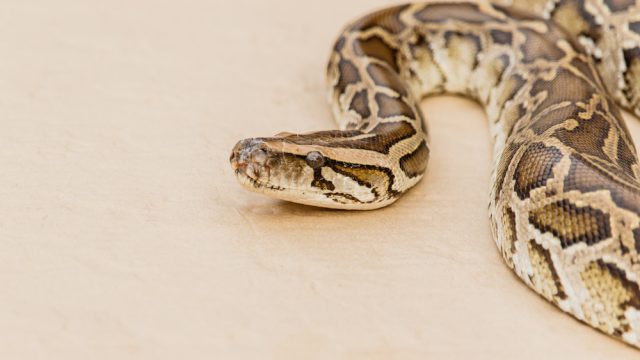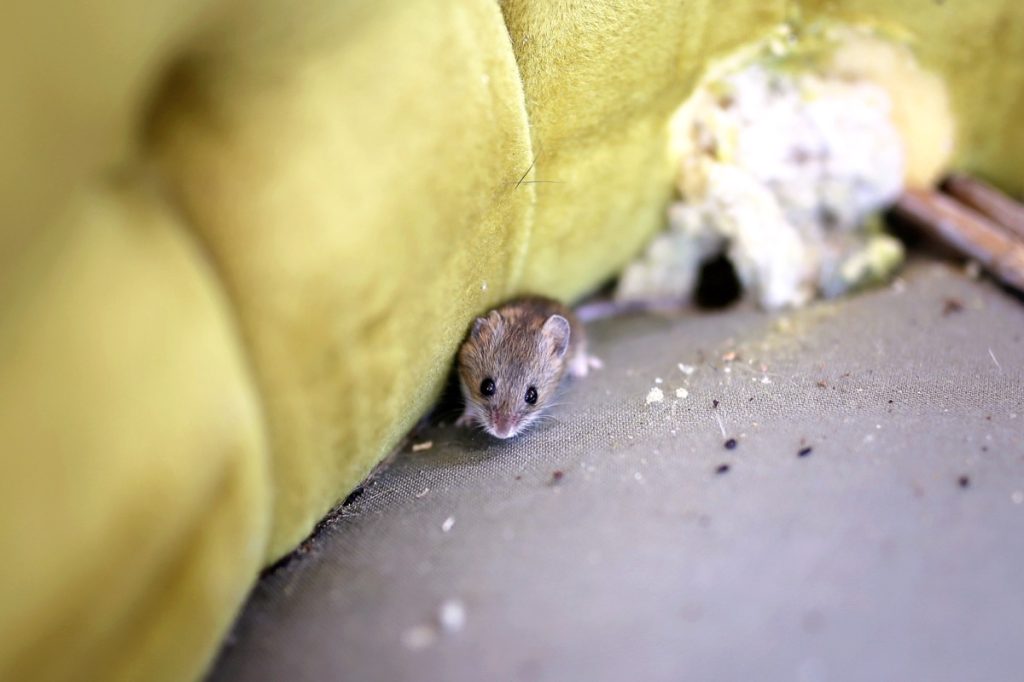The No. 1 Way to Keep Snakes Out of Your Bedroom

Animals and unwanted pests from the outside world have an unfortunate habit of making their way into our homes. In many instances, it’s somewhat expected places like the garage or your basement that end up getting invaded before they make it into the more lived-in areas like the kitchen or a bathroom. But every so often, critters can make it all the way inside to some of the places where you might least expect them—including your bedroom. Fortunately, there are ways to ensure that you’re not making your most vulnerable space inviting for any intruding reptiles. Read on to see what experts say is the number one way to keep snakes out of your bedroom.
READ THIS NEXT: The No. 1 Sign There’s a Snake Behind Your Water Heater.
There are a few reasons snakes may try to make their way into your home from outside.

No matter where you live, you should expect to see a snake on your property from time to time. In fact, they can even be considered a form of natural pest control and a sign of a healthy lawn. But every so often, they can also end up pushing the boundaries and making their way into your living space where they don’t exactly belong.
According to experts, this isn’t always entirely an accident. In some cases, they may be chasing prey, looking for a safe place to shed their skin, or they’ve simply found an easy way inside and are looking for a place to get warm. But once they do get indoors, experts say bedrooms can also provide the kind of environment they’re looking for.
“Snakes like hiding in places where they aren’t often disturbed—which is why they may like the space under your bed,” Nick Durieu from Senate Termite & Pest Control previously told Best Life.
Experts say there’s one easy way to keep snakes from hanging out in your bedroom.

No one likes the idea of being surprised by a reptile in their most personal space. But experts say snakes typically make their way into your room for the same reason as you do: to get cozy. And by keeping your room in order, you can help prevent them from ever making themselves at home.
“The number one way to keep snakes out of your bedroom is to reduce hiding spaces and clutter,” says Joe Silvestrini, owner of Pest Control Technicians, Inc. “Since snakes often live in holes and burrows, they find dark, damp areas of your room optimal to hide in. Eliminating conditions like these will make your room less attractive to them.”
This often means paying attention to certain trouble areas when it comes to disorganization. “The space under beds is dark and usually has clutter beneath them, making it the perfect place for snakes to hide and find comfort,” Todd Milsom of Delsea Termite & Pest Control previously told Best Life.
For more home advice delivered straight in your inbox, sign up for our daily newsletter.
You can also keep snakes at bay by tackling another major issue in your home.

Of course, reptiles need more than just a hiding place to survive. In many cases, snakes will be enticed to your bedroom and stick around if they’ve also got something to eat.
“The easiest and most effective way to keep snakes out of your bedroom is to control the food supply around the property,” says Meg Pearson, training manager for Critter Control.
While rodent infestations may seem like a big issue in and of themselves, Pearson says they can also be what allows snakes to stick around for a while. And just because you don’t think of your bedroom as the first place a rodent would hang out doesn’t mean they aren’t hiding nearby, either. That’s why experts say it’s so important to keep your personal space clean and tidy.
“Whether it’s garbage or clothes, as long as the clutter sits in an area, count a few days, and you’ll spot a mouse there,” Ethan Howell, co-owner of Florida Environmental Pest Management, previously told Best Life.
You should inspect your home regularly for cracks or easy entries for snakes and their prey.

As with any infestation, prevention is the best policy. That’s why experts suggest looking at the bigger picture if you’re looking to keep snakes out of your bedroom.
“A small creature like a snake could find its way easily into a home if a hole presents itself. Often, this can be through the foundation or basement level, especially if there are cracks or pieces falling away,” Victor Chirilas, director at construction company Mainmark U.K., previously told Best Life. “Snakes are curious creatures, and they could come into your house simply because they’re exploring for food and warmth and a gap, crack, or hole provides an easy entry.”
“Make sure you regularly check out the exterior of your home, especially around the ground, in order to keep pests out,” Chirilas advised. “It’s just one of the many reasons why people should look after their foundations. If a small crack or gap presents itself, you stand a very high risk of having reptiles or other animals make their way into your home.”
And if all else fails, you can always bring in extra assistance to rid yourself of any unwanted room crashers. “Consider calling a pest control company for snake removal, snake prevention recommendations, and possibly other exterminating services like rodent control that could be contributing to the issue,” says Sholom Rosenbloom, owner of Rosenbloom Pest Control.